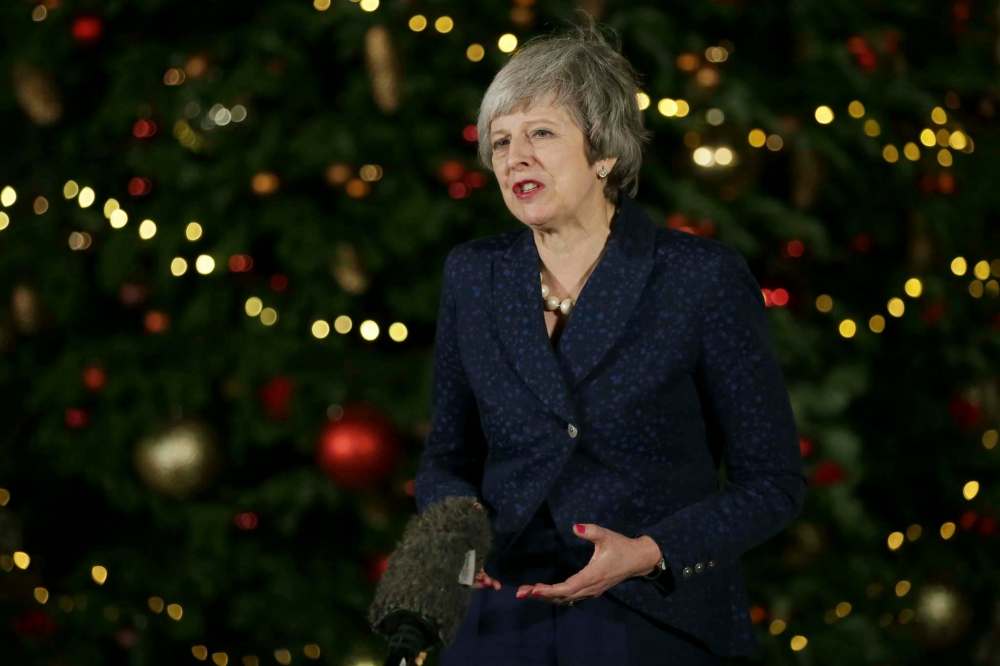No victory lap for Britain’s Theresa May
Read this article for free:
or
Already have an account? Log in here »
To continue reading, please subscribe:
Monthly Digital Subscription
$1 per week for 24 weeks*
- Enjoy unlimited reading on winnipegfreepress.com
- Read the E-Edition, our digital replica newspaper
- Access News Break, our award-winning app
- Play interactive puzzles
*Billed as $4.00 plus GST every four weeks. After 24 weeks, price increases to the regular rate of $19.00 plus GST every four weeks. Offer available to new and qualified returning subscribers only. Cancel any time.
Monthly Digital Subscription
$4.75/week*
- Enjoy unlimited reading on winnipegfreepress.com
- Read the E-Edition, our digital replica newspaper
- Access News Break, our award-winning app
- Play interactive puzzles
*Billed as $19 plus GST every four weeks. Cancel any time.
To continue reading, please subscribe:
Add Free Press access to your Brandon Sun subscription for only an additional
$1 for the first 4 weeks*
*Your next subscription payment will increase by $1.00 and you will be charged $16.99 plus GST for four weeks. After four weeks, your payment will increase to $23.99 plus GST every four weeks.
Read unlimited articles for free today:
or
Already have an account? Log in here »
Hey there, time traveller!
This article was published 14/12/2018 (2489 days ago), so information in it may no longer be current.
There are times — many of them, actually — when a victory is not cause for celebration.
British Prime Minister Theresa May experienced a particularly profound moment like that on Wednesday. By surviving a no-confidence vote among her own Conservative Party members, Ms. May won the right to continue leading her party and her country — straight into a looming Brexit debacle that is, from whichever angle one might choose to view it, a lose-lose-lose proposition.
By securing the less-than-overwhelming support of her Tory peers — the final vote was 200 to 117 — the PM returns to 10 Downing Street a substantially weakened leader who, in order to gain even the tepid approval her party offered, had to promise not to run for re-election in Britain’s next general election.

Central to Ms. May’s fight for her political life, of course, is the perilous navigation of the United Kingdom’s looming departure from the European Union, which was set in motion by a razor-thin (51.9 per cent) victory by the “Leave” side in the June 2016 referendum.
With Brexit perpetually on her figurative front burner, hers has been anything but an easy term as PM. But things have become particularly difficult of late, as the negotiations focused on Britain’s referendum-mandated departure revealed the weakness of the U.K.’s hand and the rest of the EU’s disinclination to offer anything in the way of concessions to allow a comfortable transition to post-union independence.
Ms. May emerged late last month from a final-negotiation EU summit in Brussels with an agreement for a “soft” Brexit that would afford Britain control over its borders and currency while still maintaining an arm’s-length sort of membership in the region’s common market. The PM warned at the time that the Brussels deal was the only agreement possible, and that a rejection by MPs back home would create “division and uncertainty.”
It turned out to be a deal nearly everyone in Britain could hate — hardline Brexiteers would not accept anything but a clean break from the EU, but those who had voted “Remain” felt the U.K. was humiliating itself by begging for continued association after surrendering its bargaining power by voting to leave.
When Ms. May could not even sell the deal to her own deeply divided party, the no-confidence vote became a foregone conclusion. The PM vowed last week to fight the challenge “with everything I’ve got,” and after a frantic weekend of lobbying among her peers, she succeeded in rounding up enough votes to avoid an embarrassing ouster.
“I am pleased to have received the backing of my colleagues in tonight’s ballot,” she said after the decision. “Whilst I am grateful for that support, a significant number of colleagues did cast a vote against me, and I have listened to what they said.”
One presumes she was not referring to those whose “what they said” included calls for Ms. May’s resignation.
The PM must now refocus her attention to March 29, the date Britain is scheduled to leave the EU, and her promised effort between now and then to seek concessions from the EU that will make the Brexit deal palatable to British MPs when they finally vote on it next month.
EU leaders, for their part, have already stated that the Brussels deal cannot be renegotiated.
In that context, Ms. May can be forgiven for not celebrating this week’s decidedly pyrrhic “victory.”










